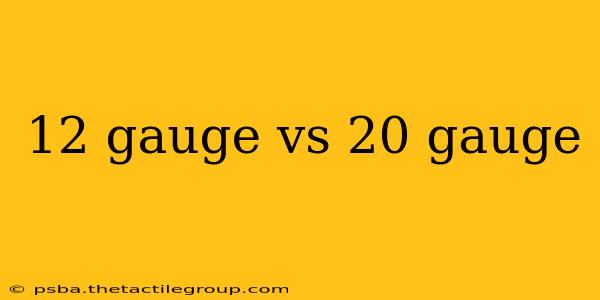Choosing between a 12-gauge and a 20-gauge shotgun is a common dilemma for both novice and experienced shooters. The decision hinges on several factors, including intended use, physical capabilities, and personal preference. This in-depth comparison will help you make an informed choice.
Gauge Explained: Understanding the Numbers
Before diving into the specifics, it's crucial to understand what "gauge" signifies. The gauge number indicates the number of lead balls, each with a diameter equal to the inside diameter of the barrel, that would weigh one pound. Therefore, a lower gauge number (like 12) means a larger diameter barrel and a larger shell.
12 Gauge: The Workhorse
The 12-gauge shotgun is the undisputed king of shotguns. Its popularity stems from several advantages:
Advantages of 12 Gauge:
- Power: 12-gauge shotguns deliver significantly more stopping power than 20-gauge shotguns. This makes them ideal for hunting larger game like deer, waterfowl, and turkey, as well as for home defense.
- Versatility: A wide variety of ammunition is available, encompassing various shot sizes, slugs, and buckshot, catering to diverse hunting and shooting scenarios.
- Availability: 12-gauge shotguns and ammunition are readily available virtually everywhere, making them easy to find and purchase.
- Recoil Management: While recoil is substantial, advancements in recoil-reducing technology have mitigated this issue, making it manageable even for smaller shooters with proper technique and equipment.
Disadvantages of 12 Gauge:
- Recoil: The significant recoil can be daunting for new shooters or those with less upper body strength. This can lead to fatigue, flinching, and reduced accuracy.
- Weight: 12-gauge shotguns tend to be heavier, making them less convenient for extended periods of carrying in the field.
- Cost: While ammunition isn't prohibitively expensive, the sheer volume used can add up, particularly for frequent shooters.
20 Gauge: The Lightweight Champion
The 20-gauge shotgun offers a compelling alternative for those seeking a lighter, more manageable firearm.
Advantages of 20 Gauge:
- Reduced Recoil: The lighter recoil makes the 20-gauge more comfortable to shoot, particularly for smaller-statured individuals or beginners. This leads to better accuracy and less fatigue.
- Lighter Weight: Its lighter weight enhances maneuverability and reduces fatigue during extended hunts or shooting sessions.
- Reduced Cost (per round): Ammunition is generally less expensive per round compared to 12-gauge, although overall cost can increase depending on volume.
Disadvantages of 20 Gauge:
- Less Power: Compared to the 12-gauge, the 20-gauge offers less stopping power, limiting its effectiveness for hunting larger game. Shot pattern may also be less consistent at longer ranges.
- Ammunition Availability: While widely available, the selection isn't as extensive as that for 12-gauge shotguns.
- Limited Applications: The reduced power restricts its suitability for certain hunting applications and self-defense scenarios.
Choosing the Right Gauge: A Decision Matrix
Ultimately, the best choice depends on your individual needs and priorities:
| Feature | 12 Gauge | 20 Gauge |
|---|---|---|
| Power | High | Moderate |
| Recoil | High | Low |
| Weight | Heavy | Light |
| Ammunition Cost | Higher (per round, can be lower overall) | Lower (per round) |
| Versatility | Excellent | Good, but more limited for larger game |
| Best Suited For | Hunting large game, home defense | Hunting smaller game, target shooting, beginners |
Conclusion: Consider Your Needs
Carefully weigh the pros and cons outlined above. If you prioritize power and versatility for hunting larger game or home defense, the 12-gauge is the clear winner. However, if reduced recoil, lighter weight, and lower cost per round are paramount, the 20-gauge is a strong contender. Consider your physical capabilities, intended use, and budget when making your final decision. Consider renting or borrowing different gauges before committing to a purchase.

